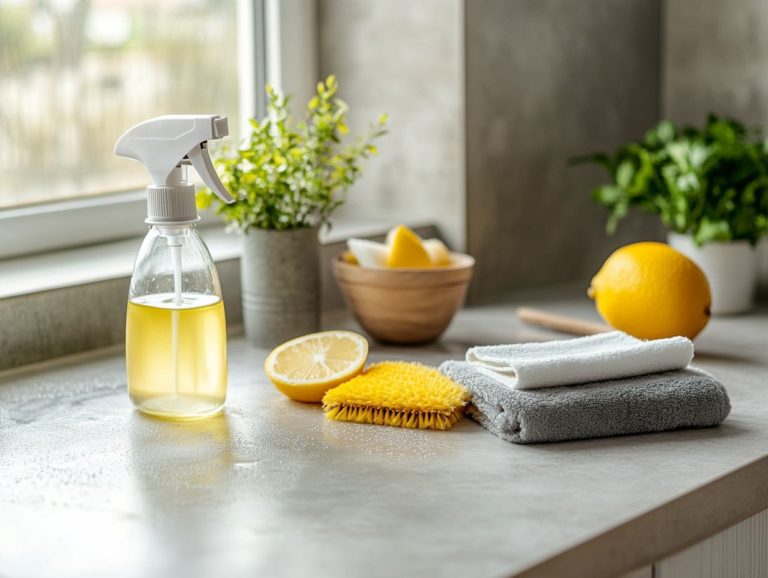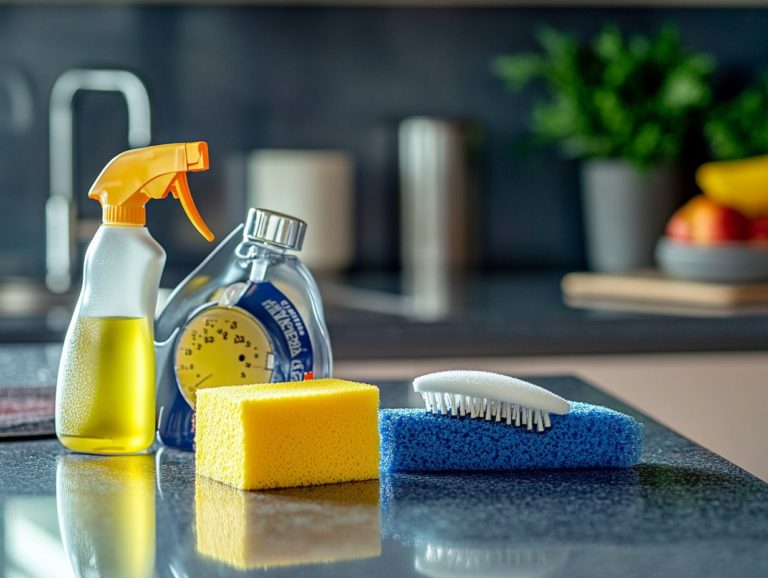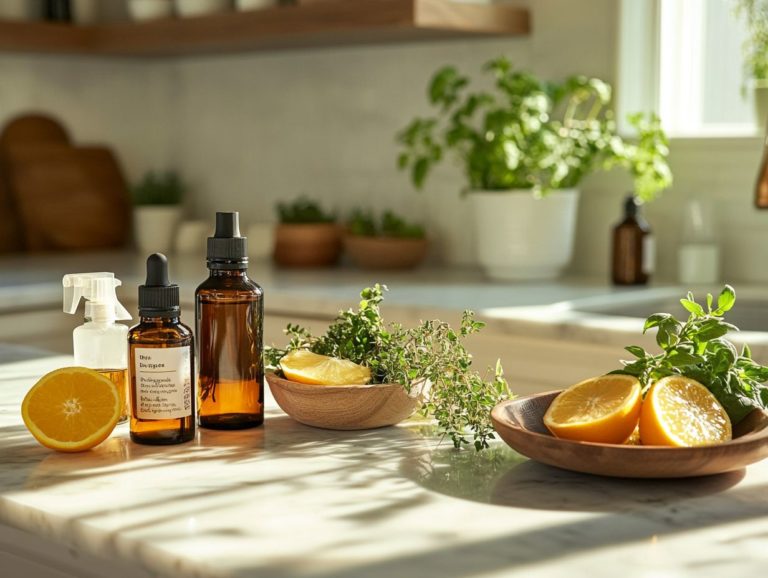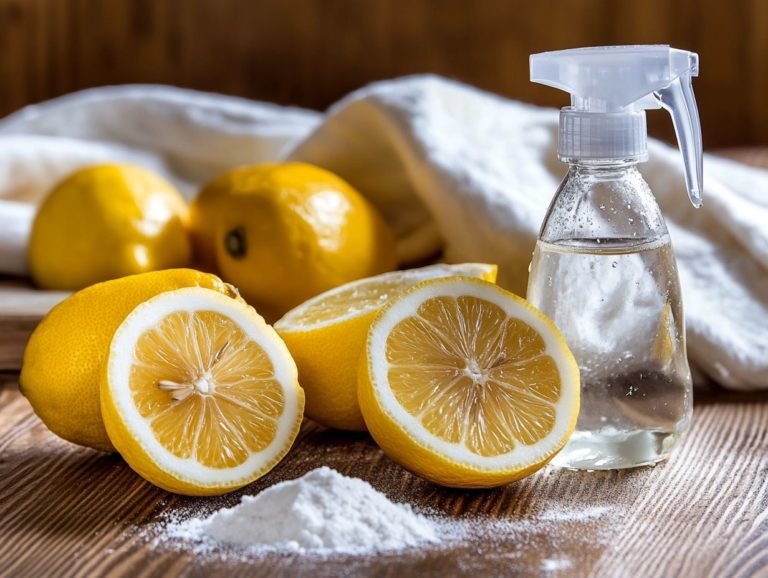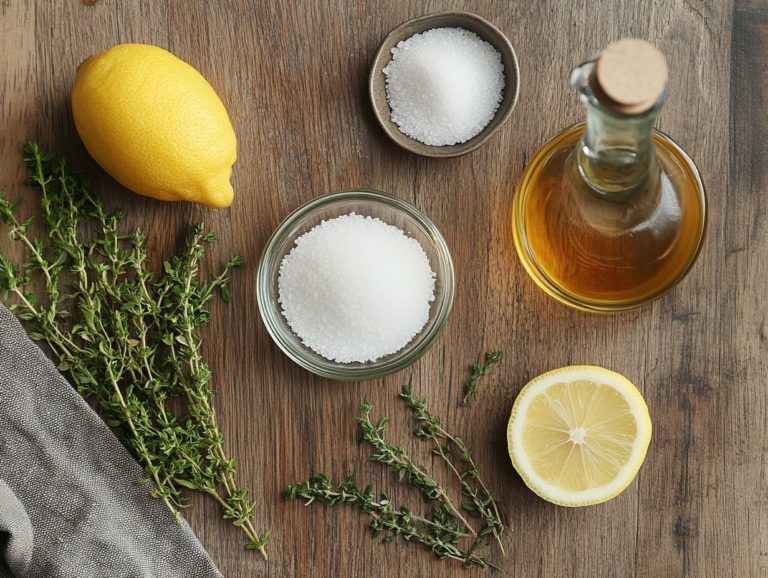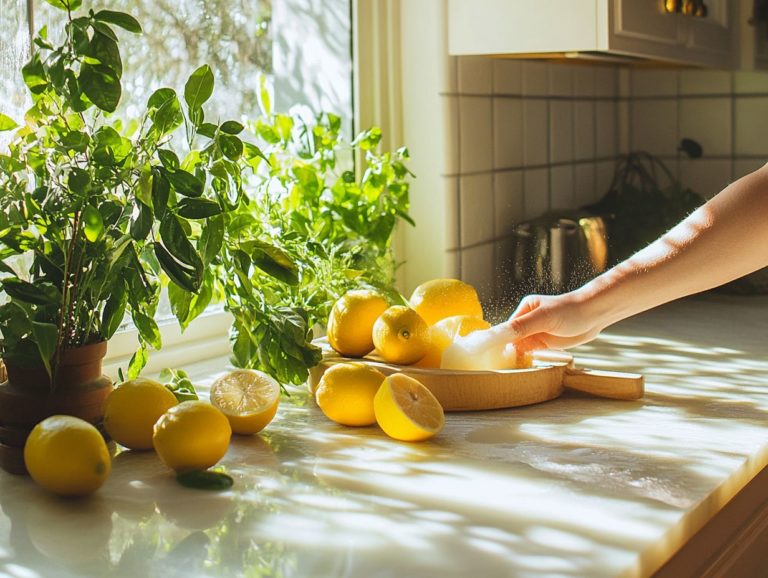How to Make a Natural Glass Cleaner?
Want a sparkling clean without harsh chemicals? A homemade glass cleaner is just what you need!
This article delves into the world of natural glass cleaners, showcasing their benefits and how they stack up against conventional products. You ll discover the common ingredients that make these cleaners effective, such as distilled white vinegar, lemon juice, and essential oils, along with simple DIY recipes you can whip up at home.
Plus, it outlines the various surfaces you can safely clean with your natural solution, ensuring you avoid cleaning residue.
You ll also learn the best practices for storing and using your homemade cleaner effectively, including tips for keeping it safe for your family.
Ready to make your windows gleam like never before with a streak-free shine? Keep reading!
Contents
Key Takeaways:
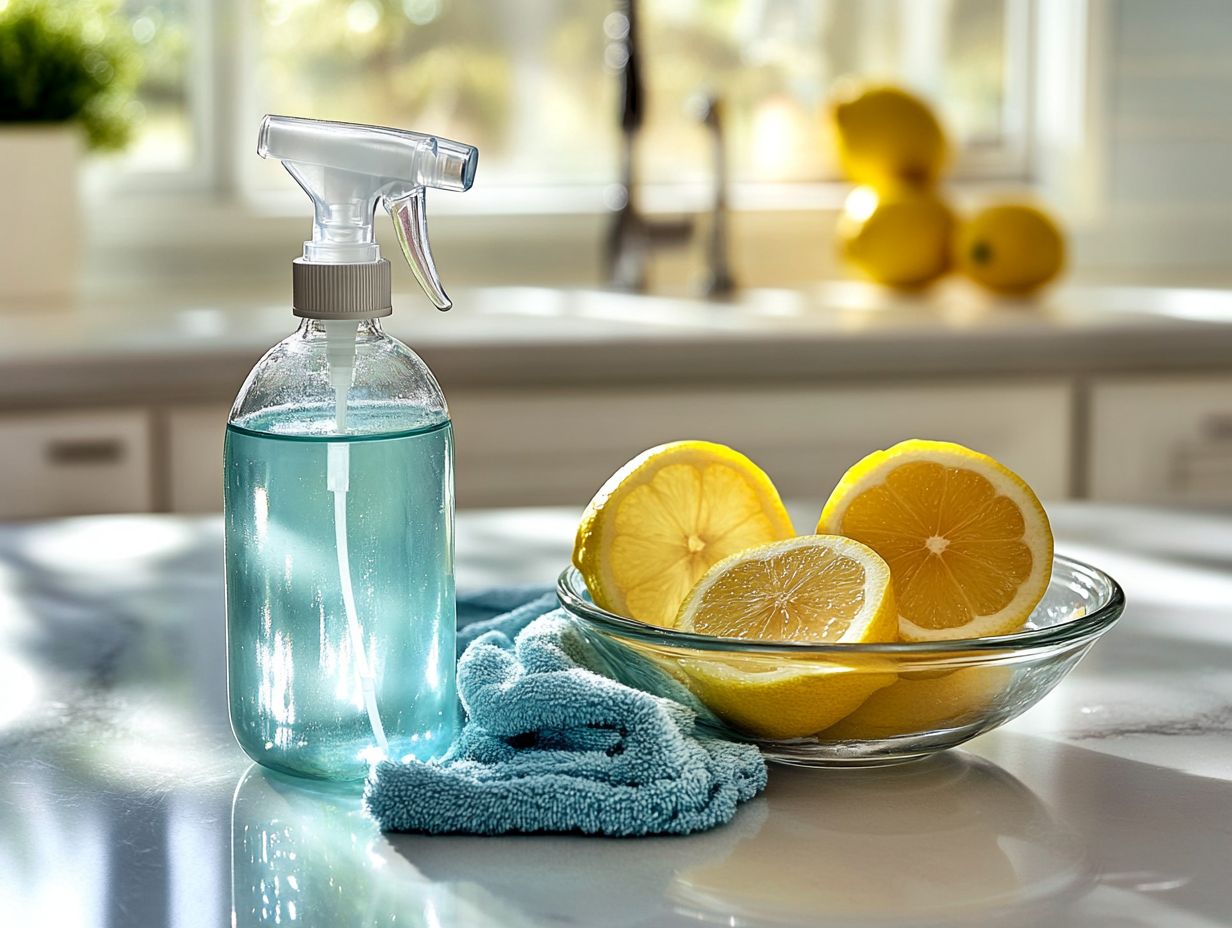
- Natural glass cleaners are environmentally-friendly and made from natural ingredients. They are excellent for those who prefer nontoxic cleaners.
- They are effective in removing dirt, grime, and streaks from glass surfaces, often outperforming ammonia-based cleaners.
- You can easily make your own natural glass cleaner using simple ingredients like distilled white vinegar, warm water, and essential oils, following DIY recipes.
What Is a Natural Glass Cleaner?
A natural glass cleaner is a simple cleaning solution crafted with safe, non-toxic ingredients that deliver impressive results on glass surfaces without using the harsh chemicals often found in conventional cleaners.
Typically composed of everyday household items like distilled white vinegar, liquid dish soap, and lemon juice, these DIY window cleaners not only provide a streak-free shine but also foster a healthier home environment by being nontoxic and safe for pets.
By steering clear of ammonia-based cleaners, you re making a conscientious choice that benefits both your pets and the planet, promoting an environmentally friendly approach.
Why Use a Natural Glass Cleaner?
Using a natural glass cleaner provides a wealth of benefits that go far beyond mere cleanliness. It also ensures the safety of your family and the environment. These cleaning solutions, typically composed of natural ingredients such as distilled white vinegar and essential oils, eliminate the need for the harsh chemicals commonly found in commercial products, reducing exposure to toxic fumes.
By choosing DIY window cleaners, you not only achieve a streak-free shine, but you also foster a healthier indoor atmosphere. This choice is particularly responsible for households with pets or children, allowing you to maintain a pristine home while prioritizing well-being.
What Are The Benefits of Using a Natural Glass Cleaner?
The benefits of using a natural glass cleaner are plentiful, focusing primarily on your health, safety, and the impressive results you can achieve. These homemade solutions often feature simple yet effective ingredients like vinegar and water, essential oils, and liquid dish soap, coming together beautifully to deliver a streak-free shine without the harsh chemicals that could jeopardize your well-being and the environment.
By choosing these eco-friendly alternatives, you can breathe easier in your home, significantly reducing your exposure to the toxic fumes common in commercial products and promoting better overall health.
Creating a natural glass cleaner is not only cost-effective many of the ingredients are likely already in your kitchen but it also sparks creativity in your everyday cleaning routine. This method has been endorsed by experts like Michael Wandschneider from Better Homes & Gardens.
For stunning results, grab your microfiber cloths now! They ensure an efficient wipe-down that leaves your surfaces sparkling. Adding a few drops of essential oils can infuse your cleaning experience with a delightful fragrance while providing antibacterial benefits, making the task all the more enjoyable.
How Is a Natural Glass Cleaner Different From Traditional Cleaners?
Natural glass cleaners stand apart from traditional cleaners in several key areas, including ingredients, safety, and environmental impact. While traditional cleaners often pack a punch with ammonia and other harsh chemicals that can leave behind harmful residues and strong odors, natural glass cleaners leverage non-toxic components like distilled white vinegar and essential oils. This makes them a much safer option for households with children and pets.
The differences don t stop at composition; they have significant implications for your health and the planet. Traditional products might slice through grime effectively, but they can also contribute to indoor air pollution and pose risks for sensitive individuals. Natural formulations provide a gentler yet highly effective alternative, catering to the increasing number of consumers who prioritize sustainable living.
Exciting new trends show a notable rise in green cleaning product sales, as more individuals gravitate toward brands that champion eco-friendly practices. Even well-established traditional brands are getting in on the action, offering eco-conscious lines like Seventh Generation. The growing popularity of ingredients such as baking soda and castile soap further demonstrates just how effective natural cleaners can be.
What Ingredients Are Used in a Natural Glass Cleaner?
A natural glass cleaner consists of straightforward yet highly effective ingredients that work together to create a strong cleaner. You will often find distilled white vinegar in the mix, serving as a natural disinfectant, while liquid dish soap brings its renowned grease-cutting prowess to the table.
To elevate the experience, essential oils like tea tree or lemon oil contribute delightful fragrances along with enhanced cleaning properties.
Get Ready to Discover the Common Ingredients in Natural Glass Cleaners Recommended by Better Homes & Gardens!
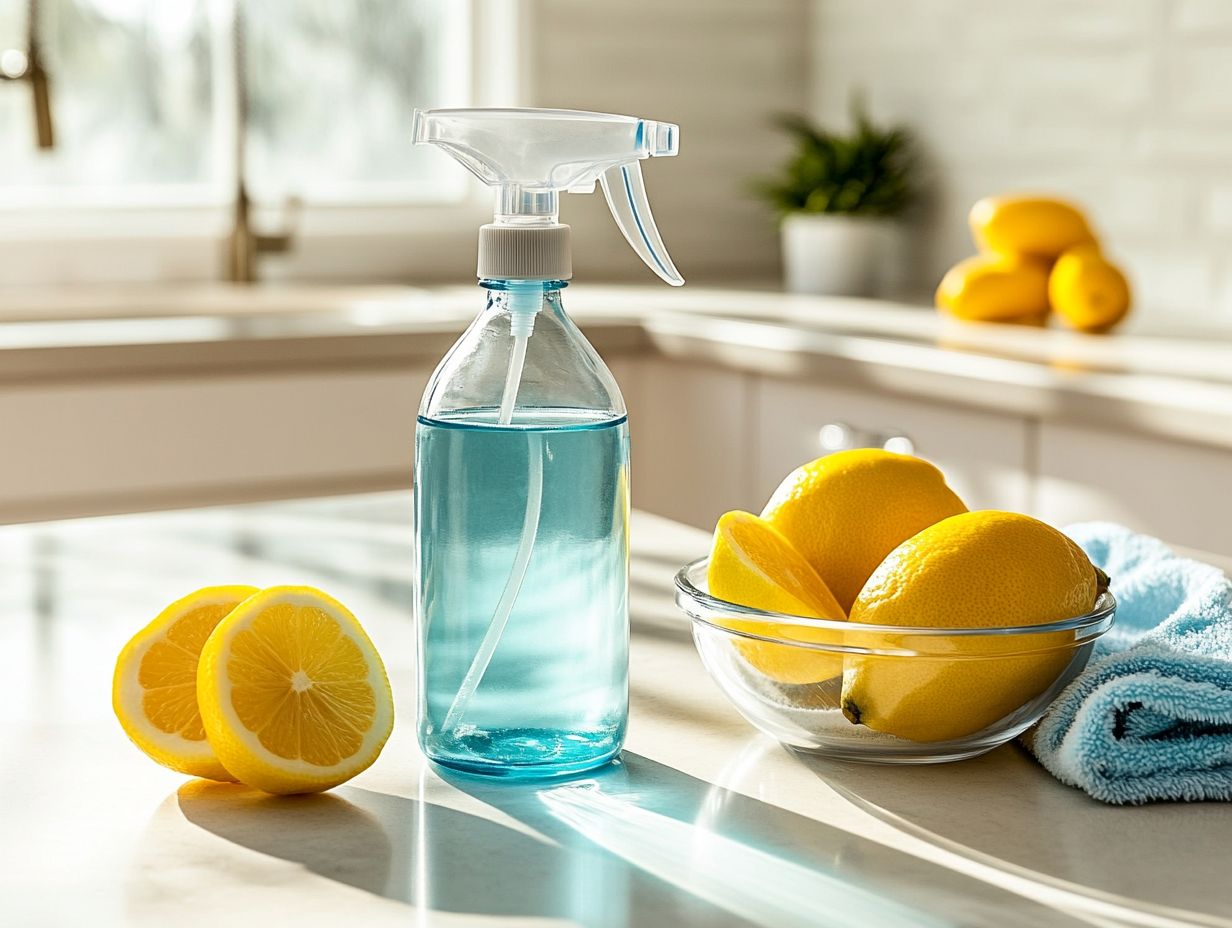
Common ingredients found in natural glass cleaners include distilled white vinegar, essential oils, lemon juice, and liquid dish soap. Each of these components plays a vital role in enhancing the cleaning power of your solution. Vinegar cuts through grime and disinfects, while lemon juice adds a fresh scent and extra cleaning efficacy. Other helpful ingredients might include rubbing alcohol, cornstarch, and sodium lauryl sulfate, a common cleaning agent often found in household products, for added cleansing prowess.
Distilled white vinegar, derived from fermented grain alcohol, serves as an excellent eco-friendly disinfectant that effectively tackles dirt and grease. Essential oils, like tea tree or lavender, not only infuse your cleaner with delightful fragrances but also bring inherent antibacterial properties to the mix. Lemon juice, packed with citric acid, further boosts your solution s ability to dissolve mineral deposits and leave surfaces gleaming, as suggested by cleaning experts such as CJ Younger.
Liquid dish soap, a household staple, assists in emulsifying dirt and grease, ensuring that all residues are lifted away. Together, these ingredients harmonize beautifully, creating a powerful synergy that offers an effective, natural alternative to commercial glass cleaners all while being gentle on the environment.
What Are The Benefits of Each Ingredient?
Each ingredient in your natural glass cleaner serves a specific purpose, elevating the overall effectiveness of your cleaning solution. For instance, distilled white vinegar boasts acetic acid, a natural compound responsible for vinegar s disinfecting qualities, while liquid dish soap excels at lifting and dissolving dirt and grease, delivering a streak-free shine.
Baking soda joins the party with its mild abrasive qualities, perfect for tackling tougher stains without scratching your surfaces. Its alkaline nature helps neutralize acids, resulting in a more balanced and effective cleaning solution.
You might also consider adding essential oils like lemon or tea tree oil, which not only offer a refreshing scent but also provide antimicrobial properties, enhancing your cleaner’s ability to eliminate germs.
Together, these ingredients create a powerful yet safe formula that cleans glass surfaces beautifully while promoting a healthier environment an excellent choice for anyone seeking eco-friendly cleaning options.
Try making your own natural glass cleaner today for a healthier, sparkling home!
How to Make a Natural Glass Cleaner?
Crafting a natural glass cleaner at home is both straightforward and economical. This DIY approach enables you to tailor the solution to your personal preferences.
By blending ingredients like distilled white vinegar, liquid dish soap, and a few drops of essential oils in a spray bottle, you can effortlessly create an effective cleaner that delivers remarkable results while remaining gentle on the environment.
What Are The Steps to Make a Natural Glass Cleaner?
Creating your own natural glass cleaner is a breeze. It requires just a few simple steps that promise a quick and hassle-free experience. Start by gathering your ingredients: distilled white vinegar, liquid dish soap, warm water, and essential oils, which you ll combine in a spray bottle for convenience.
- Measure out one cup of distilled white vinegar and pour it into the spray bottle, a tip endorsed by Better Homes & Gardens.
- Add just a drop or two of liquid dish soap remember, too much can leave behind a pesky residue.
- Fill the remaining space in the bottle with warm water, taking care not to overfill it.
- Feel free to experiment by adding 10-15 drops of your favorite essential oil. Lemon gives a refreshing scent, while tea tree oil offers antibacterial benefits.
After mixing the ingredients, give the bottle a gentle shake to ensure they re well combined. For best results, use a microfiber cloth to wipe your glass after spraying. Enjoy that satisfying, streak-free shine!
For additional tips and techniques, visit Better Homes & Gardens or consult the EPA guidelines on eco-friendly cleaning.
What Are Some Recipes for Making a Natural Glass Cleaner Featured in Better Homes & Gardens?
You have a range of effective recipes at your disposal for crafting a natural glass cleaner that suits your preferences and cleaning needs. One straightforward option involves mixing equal parts distilled white vinegar and warm water. Another delightful variation includes a few drops of liquid dish soap and a splash of lemon juice to enhance its cleaning prowess.
For those stubborn streaks on your windows, a concoction of club soda and cornstarch works wonders. If you enjoy a fresh fragrance while cleaning, consider adding essential oils like lavender or peppermint; they will leave behind a lovely scent after you ve finished.
These mixtures are not only simple to whip up but also eco-friendly, making them an excellent choice for those keen on reducing their environmental footprint.
Each of these methods showcases the versatility of natural ingredients, ensuring that you can find a glass cleaning solution perfectly tailored to your specific needs and surfaces, whether you re tackling mirrors, car windows, or delicate glassware. For those particularly interested in plant biology, using these natural cleaners can be a great way to incorporate eco-friendly practices into your household routines.
What Surfaces Can a Natural Glass Cleaner Be Used On?
A natural glass cleaner can be your go-to solution for a multitude of surfaces, elevating your cleaning toolkit with its versatility. It’s especially adept at tackling windows, mirrors, and glass stovetops, delivering a streak-free brilliance while maintaining a safe atmosphere for both pets and children.
Home cleaning experts like Michael Wandschneider and Jessica Bennett often recommend such natural solutions for effective and safe cleaning.
Try these natural recipes today and see how they transform your cleaning routine!
Can a Natural Glass Cleaner Be Used on Tinted Windows?
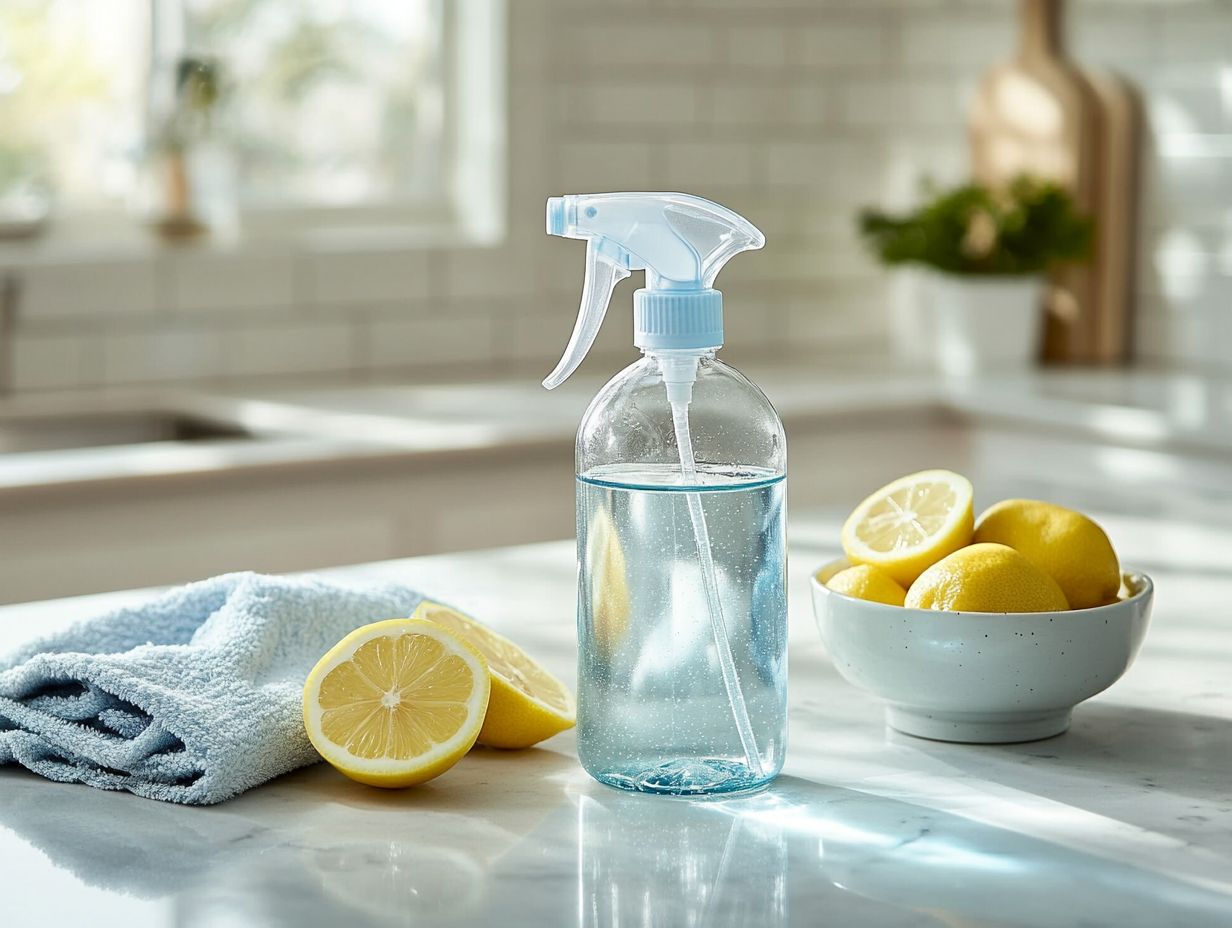
Certainly, a natural glass cleaner can be safely used on tinted windows, as long as the ingredients are gentle and non-damaging. A simple solution of distilled white vinegar and water offers an effective cleaning option without risking harm to the film or tint on your windows.
Avoid ammonia-based cleaners completely, as these can cause peeling or discoloration over time.
It’s important for you to consider the specific type of tint applied, as some may be more sensitive to particular cleaning agents than others. When you set out to clean, make sure to use a soft microfiber cloth to avoid scratching the surface.
It s also wise to choose cooler times of the day for cleaning, as this prevents the solution from drying too quickly and leaving behind streaks. Experts like CJ Younger and Emily Estep from Better Homes & Gardens recommend this approach for effective cleaning.
By adhering to these guidelines, you can maintain the beauty and integrity of your tinted windows while achieving a crystal-clear finish.
Can a Natural Glass Cleaner Be Used on Mirrors?
A natural glass cleaner is an exceptional choice for your mirror cleaning needs, delivering a streak-free shine while easily erasing fingerprints and smudges. By combining distilled white vinegar with essential oils, you can achieve sparkling clarity without harmful residues.
Using rubbing alcohol enhances the cleaning power and evaporates quickly to avoid streaks. For optimal results, apply the solution with a microfiber cloth; this approach helps prevent lint and minimizes scratches on the mirror’s surface.
Remember to spray the cleaner directly onto the cloth instead of the mirror itself to avoid drips that can create unsightly streaks. As you wipe, employ a circular motion, gradually transitioning from one side to the other for an even application.
A second clean and dry microfiber cloth works well to buff the mirror, enhancing shine and ensuring no streaks remain. The vinegar acts as a natural degreaser, breaking down grime, while essential oils add a delightful aroma and antibacterial properties.
This makes your cleaning method both effective and eco-friendly, elevating your cleaning routine to a new level of excellence.
Can a Natural Glass Cleaner Be Used on Glass Stovetops?
Natural glass cleaners can work wonders on your glass stovetop, as long as they re made from safe, nontoxic ingredients that won t scratch or damage the surface. A simple blend of liquid dish soap and vinegar, enhanced with a bit of baking soda, cleans effectively and cuts through tough grease with ease.
To elevate your cleaning game, sprinkle some baking soda on the stovetop; its mild abrasiveness is just what you need. Next, spritz your homemade cleaner over it and let the mixture sit for a few minutes to loosen any stubborn stains.
When it s time to wipe away the mixture, reach for a soft microfiber cloth to prevent scratches. Keep your cleaner from drying out for the best results, as this can lead to streaks and make grime tougher to tackle. For particularly stubborn, burnt-on messes, gently scrub with a plastic scraper to lift food particles without damaging the glass surface.
Just remember to ensure the stovetop is cool before diving into cleaning for your safety and comfort. Consider using hydrogen peroxide as part of your cleaning mix for an added level of disinfecting, ensuring that your solution is both effective and serves as a homemade disinfectant.
Make sure to clean your stovetop often to prevent build-up and maintain its shine. Try these tips today and enjoy spotless, sparkling surfaces!
How to Store and Use a Natural Glass Cleaner?
Store your natural glass cleaner carefully. This will enhance its effectiveness and extend its shelf life.
Keep your cleaning solution in a spray bottle away from direct sunlight and extreme temperatures. Using opaque containers will preserve the longevity of your cleaning solutions.
This approach will help maintain the integrity of the ingredients, allowing you to enjoy crystal-clear results every time you clean.
What Is the Shelf Life of a Natural Glass Cleaner?
The shelf life of your natural glass cleaner can vary based on the ingredients you choose. Typically, it can last anywhere from several weeks to a few months when stored in a cool, dark place.
Ingredients like vinegar, known for their natural preservative qualities, play a crucial role in extending the lifespan of your cleaning solution. According to experts from the EPA and National Geographic Traveler, using natural preservatives like acetic acid can help maintain the efficacy of your DIY recipes.
Be mindful that factors like temperature fluctuations and exposure to direct sunlight can diminish its effectiveness over time. To determine if your cleaner is still viable, watch for any changes in color, consistency, or odor. These could be signs that the product has degraded.
Emily Estep from Better Homes & Gardens advises checking these factors regularly for maximum cleaning efficacy. Opaque containers can protect your cleaner from harmful light.
Storing it in a stable, cool environment will help prevent heat-related damage. Want to maximize the shelf life of your natural glass cleaner? Consider preparing small batches that can be used quickly. This way, you minimize the time the cleaner sits unused, ensuring you always have a fresh and effective solution at your fingertips.
Jessica Bennett from Better Homes & Gardens recommends this approach for maintaining the integrity of your cleaning solutions.
How to Properly Store a Natural Glass Cleaner?
Want to keep your natural glass cleaner fresh? Use an opaque spray bottle to block out harmful light. Keep it in a cool, dry spot, away from direct sunlight.
This simple step helps maintain the integrity of the ingredients, ensuring maximum cleaning efficacy whenever you reach for it. National Geographic Traveler suggests using high-quality containers to further prolong the effectiveness of your natural cleaner.
Choose containers made of glass or strong plastic containers. These are strong plastic containers that won’t react with your cleaner. Proper storage is essential because exposure to light and heat can degrade vital components, ultimately diminishing effectiveness.
When you factor in cluttered storage spaces or fluctuating temperatures, the risk of contamination can rise, further impacting performance. By selecting suitable containers and storing them correctly, you will extend the product s lifespan and guarantee an efficient cleaning experience every time you apply your natural cleaner.
Experts like Michael Wandschneider recommend ensuring your storage area is free from excessive heat and light to maintain your cleaning solutions’ quality.
How to Use a Natural Glass Cleaner?
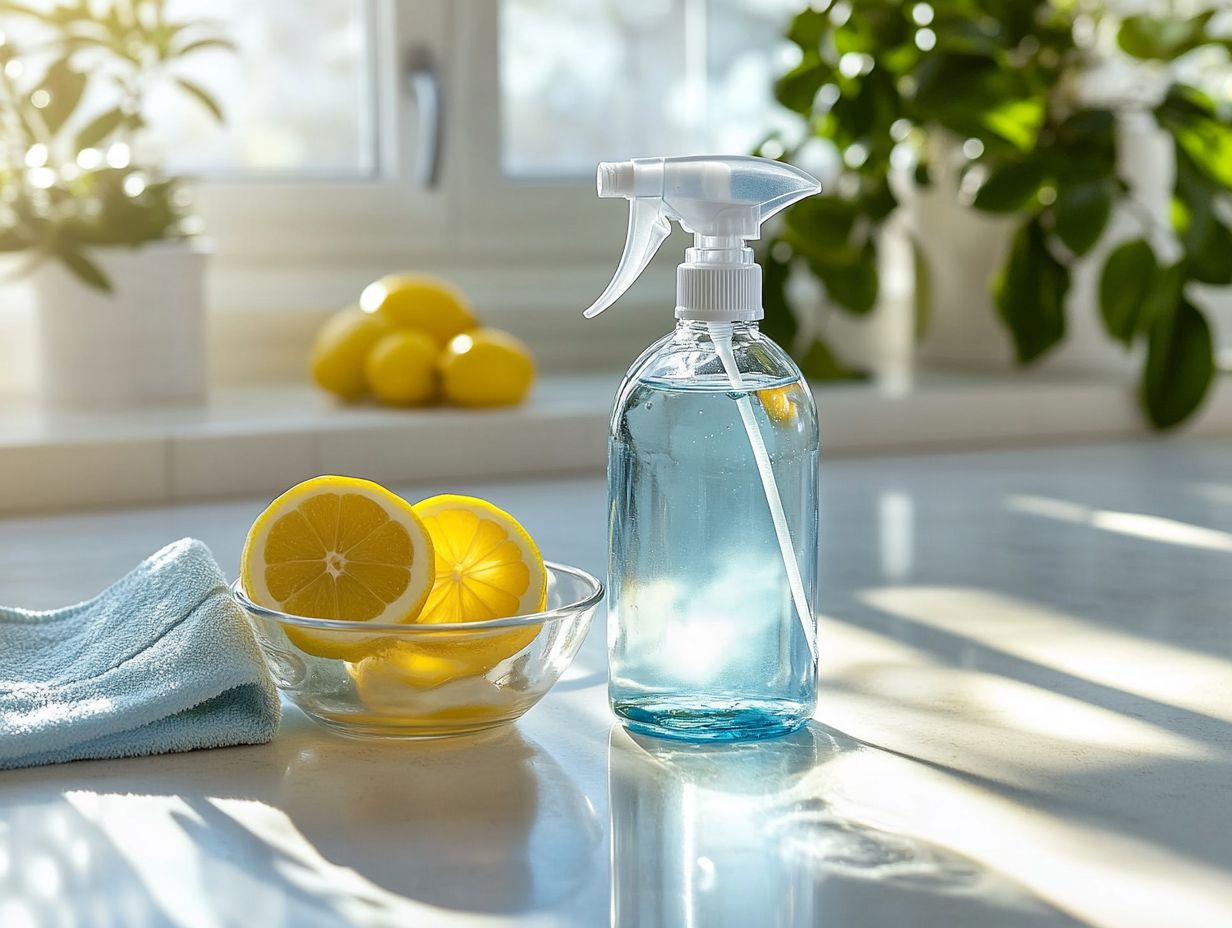
Get ready to shine your glass surfaces effortlessly with this simple and effective natural cleaner! Just spray the solution on the surface and wipe it away with a microfiber cloth for best results.
To achieve an impeccable finish, work in small sections. Start at the top corner and move downwards for even coverage.
Avoid cleaning in direct sunlight. The heat can cause the cleaner to evaporate too quickly, leaving unsightly streaks.
If you encounter tough spots, let the cleaner sit for a minute before wiping. For stubborn residues, consider using a plastic scraper.
Frequently Asked Questions
What ingredients do I need?
To make a natural glass cleaner, you’ll need white vinegar, water, rubbing alcohol, and optional essential oils. Add lemon juice for an extra cleaning boost!
Can I use any type of vinegar?
Yes, both white vinegar and apple cider vinegar work. However, white vinegar is preferred for cleaning.
How do I mix the ingredients?
Mix equal parts vinegar and water, then add a small amount of rubbing alcohol (about 1/4 cup for every 2 cups of vinegar and water). You can also add a few drops of essential oils for a pleasant scent!
Can I use this cleaner on all glass surfaces?
Yes! This cleaner is safe for windows, mirrors, and glass stovetops. Always test on a small area first.
How do I use my DIY window cleaner?
Simply spray the cleaner onto the glass and wipe with a microfiber cloth. For stubborn stains, let it sit for a few minutes before wiping.
Will it leave streaks?
No, if mixed and applied correctly, it should not leave streaks. Use a clean cloth and avoid excess cleaner for the best results!

